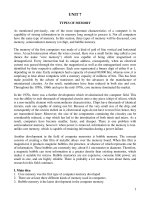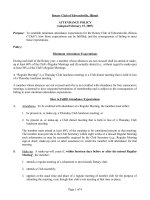Tài liệu In Search of Burningbush docx
Bạn đang xem bản rút gọn của tài liệu. Xem và tải ngay bản đầy đủ của tài liệu tại đây (936.86 KB, 289 trang )
In
Search of
Burningbush
This page intentionally left blank
a story of golf,
friendship,
and the
meaning of irons
In
Search of
Burningbush
Michael Konik
Copyright © 2004 by Michael Konik. All rights reservedManufactured in the United States of America.
Except as permitted under the United States Copyright Act of 1976, no part of this publication may be
reproduced or distributed in any form or by any means, or stored in a database or retrieval system, with-
out the prior written permission of the publisher.
0-07-148324-1
The material in this eBook also appears in the print version of this title: 0-07-146732-7.
All trademarks are trademarks of their respective owners. Rather than put a trademark symbol after every
occurrence of a trademarked name, we use names in an editorial fashion only, and to the benefit of the
trademark owner, with no intention of infringement of the trademark. Where such designations appear in
this book, they have been printed with initial caps.
McGraw-Hill eBooks are available at special quantity discounts to use as premiums and sales promotions,
or for use incorporate training programs. For more information, please contact George Hoare, Special Sales,
at or (212) 904-4069.
TERMS OF USE
This is a copyrighted work and The McGraw-Hill Companies, Inc. (“McGraw-Hill”) and its licensors
reserve all rights in and to the work. Use of this work is subject to these terms. Except as permitted under
the Copyright Act of 1976 and the right to store and retrieve one copy of the work, you may not decom-
pile, disassemble, reverse engineer, reproduce, modify, create derivative works based upon, transmit, dis-
tribute, disseminate, sell, publish or sublicense the work or any part of it without McGraw-Hill’s prior
consent. You may use the work for your own noncommercial and personal use; any other use of the work
is strictly prohibited. Your right to use the work may be terminated if you fail to comply with these terms.
THE WORK IS PROVIDED “AS IS.” McGRAW-HILL AND ITS LICENSORS MAKE NO GUARAN-
TEES OR WARRANTIES AS TO THE ACCURACY, ADEQUACY OR COMPLETENESS OF OR
RESULTS TO BE OBTAINED FROM USING THE WORK, INCLUDING ANY INFORMATION
THAT CAN BE ACCESSED THROUGH THE WORK VIA HYPERLINK OR OTHERWISE, AND
EXPRESSLY DISCLAIM ANY WARRANTY, EXPRESS OR IMPLIED, INCLUDING BUT NOT
LIMITED TO IMPLIED WARRANTIES OF MERCHANTABILITY OR FITNESS FOR A PARTICU-
LAR PURPOSE. McGraw-Hill and its licensors do not warrant or guarantee that the functions contained
in the work will meet your requirements or that its operation will be uninterrupted or error free. Neither
McGraw-Hill nor its licensors shall be liable to you or anyone else for any inaccuracy, error or omission,
regardless of cause, in the work or for any damages resulting therefrom. McGraw-Hill has no responsi-
bility for the content of any information accessed through the work. Under no circumstances shall
McGraw-Hill and/or its licensors be liable for any indirect, incidental, special, punitive, consequential or
similar damages that result from the use of or inability to use the work, even if any of them has been
advised of the possibility of such damages. This limitation of liability shall apply to any claim or cause
whatsoever whether such claim or cause arises in contract, tort or otherwise.
DOI: 10.1036/0071467327
We hope you enjoy this
McGraw-Hill eBook! If
you’d like more information about this book,
its author, or related books and websites,
please click here.
Professional
Want to learn more?
For Stephanie Ellis
This page intentionally left blank
vii
Contents
1 Slowly but Surely 1
2 The First Time 13
3 Gone but Not Forgotten 27
4 Let’s Go! 43
5 Are We There Yet? 63
6 Treasure Island 79
7 A House and a Home 97
8 Earth, Wind, and Fire 117
9 Ghosts 137
10 Talking with the Oracle 167
11 In Search of Burningbush 175
12 History 191
13 Seeing Things 205
14 Lowdown 217
15 Sheep 227
16 Try, Traigh, Try 237
17 Numbers Don’t Lie 249
18 Possibilities 267
Acknowledgments 279
For more information about this title, click here
This page intentionally left blank
1
1
Slowly but Surely
“Scyoose m’ sar! A roond a gowf us s’posta tek thuree oohers! Nay
sex!”
If I understand the shouting of this incensed Scottish fellow cor-
rectly—and there’s always the outside chance I’ve completely mis-
taken his livid burr for an enthusiastically warm welcome—what
he means to tell me is that a proper game of golf here in the land
where the sport began is supposed to take only three hours to play.
Not four. Not five. And for the love of Old Tom Morris, certainly
not six!
“I’m very sorry,” I say, truly very sorry. Like a guest in a stranger’s
home, I know two Americans playing golf in Scotland ought to be
on their best behavior. Holding up the foursomes behind us hardly
qualifies as impeccable manners, particularly since the club we are
at, Royal Aberdeen, welcomes only a limited number of nonmem-
ber visitors. And besides, I myself know the frustration, the grow-
ing agony, of being stuck behind a group of sod-chunking snails
weaned on the glacial pace of televised professional golf. Most
Americans, emulating Tiger Woods and his highly sponsored col-
Copyright © 2004 by Michael Konik. Click here for terms of use.
leagues, view a round of golf as an all-day affair best enjoyed at a
crawl, as though the participants were coated with some sort of vis-
cous fluid meant to lubricate their knees and elbows. The Scots, on
the other hand, view a round of golf as a vigorous walk through the
park—or along the sea, or upon the moors—best enjoyed as though
the game were indeed a happy form of exercise, not merely an
excuse to sit in a motorized cart and drink beer. The Scots leave
slowness for their swings.
Gesturing with my head toward my companion, Don Naifeh,
making his way toward the fourteenth tee, I tell the justifiably angry
Scotsman that we’re doing our best, but that, well, at a certain point
there’s only so fast Don can move.
The local fellow sighs hotly and harumphs back to his group on
the thirteenth green.
“Like Casey Martin,” I offer, weakly.
Fairly sprinting to the teeing ground of the fourteenth, the num-
ber one handicap hole, I join Don, who is breathing heavily and
perspiring even more so.
“What was that all about?” he asks me.
“Just a little request that maybe we might pick up the pace a lit-
tle,” I say, as diplomatically as possible. “Don’t worry about it. We’ll
just let them play through.”
“Sure,” Don says. “I could use a little rest, anyway.”
We hit our tee shots. Don lays up with a 3 iron short of the ditch
that gives the fourteenth, “Dyke,” its name. I foolishly use my driver,
partially in the hope I might fly my golf ball over all the trouble and
leave myself a little wedge shot into the hard-as-an-industrial-
diamond green. But the real reason for my poor club selection, I
realize as we walk down the fairway, is to provide a physical release
for the mild embarrassment I feel for holding up play at one of the
oldest golf clubs (founded 1780!) on the planet. The satisfying crack
IN SEARCH OF BURNINGBUSH
2
of titanium meeting Surlyn somehow gives me the same kind of
cathartic pleasure some patients derive from punching feather pil-
lows in their weekly psychotherapy sessions.
Fueled by a growing frustration with my partner’s unintentional
breaches of etiquette—this will be the third group that has had to
play through us today—I swing extra hard. Predictably, my drive
flies forever and crooked somewhere over the dyke in the left rough.
Don, on the other hand, huffing audibly, composes himself long
enough to make his usual smooth pass at the ball, a replica of the
simple rhythmic motion he makes every time he swings a golf club.
Seventy yards short of where my wayward pellet has come to rest,
Don plunks his tee shot into the short grass.
Trying vainly to banish thoughts of “The Tortoise and the Hare”
metaphors from my mind, I march off into the high weeds.
I wave on the group behind us. While the charging foursome of
Scotsmen play their tee shots, I stand in the rough looking back-
ward toward the tee. Don, I notice with some chagrin, is lying down
on the right side of the fairway, apparently staring at the flinty blue
sky. Since each member of the quartet on the tee seems to have also
selected a driver, he’s probably not in any imminent danger of get-
ting dinged. But I half suspect Don wouldn’t mind if he were, any-
way. He’d probably say if he was meant to go, it would be on a golf
course where he’d like to perish.
One of the Scots hits short of the dyke into the left rough. Two
of them fly directly into it. And the other clears it and rolls up near
my black carry-bag.
I watch them stomping up the fairway, past my supine friend.
Please, I pray, don’t let this turn into something out of Braveheart.
No war cries. No blood.
From my distant vantage, their brief conversation seems to con-
tain nothing but the usual golf pleasantries—fine day, thanks very
SLOWLY BUT SURELY
3
much, on you go, and so forth—though the Scotsmen don’t seem
particularly eager to stand around and chat with a sweaty Ameri-
can prone upon their ancient links.
While two of the gents fish their balls out of the dyke, a perni-
cious four-foot rut crossing the fairway, the big hitter approaches
me and his ball. It’s the same perturbed man from the previous
green.
“Right here,” I say, pointing toward his ball with as much sweet-
ness and courtesy as a guy 3 down with five to play can muster.
The Scotsman waves at me. “Rrreight. Thunks.”
I look into his blue eyes. “Again, sir,” I say apologetically, “I regret
the slow play.”
“Nay, nay,” he says, shaking his sandy-haired head. “I dinna
knew aboot hum.”
I could say more, and so could he. But we both understand.
The Scotsman plays on, and so do his companions, and I know
as they trot off into the late afternoon light, Don Naifeh and I will
likely never see them again. But I know they’ll always remember the
two American chaps they played through today, the talkative one
with apologies at the ready and the odd fellow with a cigarette dan-
gling from his mouth and a peculiar shoe on his right foot.
Royal Aberdeen—known locally as the Balgownie Links—is one of
the most rugged golf courses in a country teeming with rugged-
ness. The elephantine sand dunes here, created by wind and sea,
form natural amphitheaters through which the fairways scurry and
off which the clever player is compelled to bounce all manner of
golf shots. Royal Aberdeen is a cheering sight—and site—to any-
one who cherishes primal golf, the kind of hardy challenge best
enjoyed in an otherworldly landscape of mounds and craters, gul-
IN SEARCH OF BURNINGBUSH
4
lies and bluffs. Unless you are strong and fit, it is not, however, the
kind of place one would choose for a pleasant afternoon stroll.
Training for an Olympic steeplechase event, sure. But a little prom-
enade along nicely manicured lawns? Not at Royal Aberdeen.
Which is why I’m mildly concerned. The caddies Don and I have
requested haven’t shown. (This happens occasionally—particularly,
I’ve noticed over the years, when a big football match is on the telly.)
Either we cancel our round—and there’s less chance of that hap-
pening than of my breaking 70—or we sling our bags over our
shoulders like the average Scotsman does and get ourselves (and
our equipment) around the four-and-a-half-mile lunar loop.
“What do you think?” I ask Don, already knowing the answer.
“Oh, we’re playing,” he assures me. “If I can just get a—what do
they call them here?”
“A trolley,” I say.
“Yeah, a trolley. And a yardage book.”
“Sure. No problem.”
“Nah. No problem. I’ll be fine, Michael,” he says, in the way a
first-time marathon runner tells himself there is no such thing as
the mythical wall. “Really. No big deal.”
Well, for my friend Don it is a big deal. But we’re going to mutu-
ally pretend it isn’t.
“Do you want to call off our bets?” I wonder.
“Hell, no!” Don says, scowling.
Though Don typically beats me like a drum in our $10 Nassau
(with two-down automatic presses), I decide to even the playing
field—if such a thing can be done on a place as rolling and bumpy
as the Balgownie Links. Today I shall play without benefit of a
yardage book. I figure I’ve got the physical advantage; I’ll let him
have the psychological advantage. With neither caddie nor “score-
saver,” which Don consults religiously whether he has a caddie or
not, I vow to play this round completely by eye, as have thousands
SLOWLY BUT SURELY
5
of players before me on these storied grounds, which don’t even
bother with 150-yard stakes, not to mention labeled sprinkler
heads. He’ll have the discomfort of having to lug his own sticks up
and down the giant dunes; I’ll have the discomfort of not really
knowing how far away my target is. This will be a classic matchup:
Infirmity versus Insecurity.
The first tee at Royal Aberdeen Golf Club sits directly in front of
a stately white clubhouse, whose large picture windows afford a
splendid perspective of the Grampian coast. Members enjoying the
otherwise unspoiled view of the North Sea may choose to inspect
the swings of visiting hackers—or turn away in horror, if necessary.
As I wave a few irons to warm up, I notice several of the club’s older
members looking toward me and Don, trying discreetly not to stare.
It must be difficult. We are, admittedly, quite a sight: both wearing
floppy bucket hats of the Gilligan-meets-Jim-Colbert variety; both
toting identical Ping Mantis golf bags (at two pounds, four ounces,
among the lightest made, and cleverly designed for the walking
golfer); both playing Titleist DCI irons. Plus, I’ve got this all-red Tad
Moore Skyrider driver, now a collector’s item, that looks vaguely
like a Porsche 911 painted with lurid nail polish. And Don—well,
Don tends to draw looks no matter what color sticks he plays with.
Most clubs in Scotland don’t have practice ranges of the Ameri-
can sort, where one blasts shag balls with impunity, certain that a
sullen teenager driving a tractor and listening to Rage Against the
Machine in his headphones will eventually sweep them all up and
return them for future beatings. In Scotland, if you want to prac-
tice, you find an empty field and shag the balls yourself. On the one
hand, this teaches you from an early age that golf is a game of accu-
racy, not distance. On the other hand, it discourages American vis-
itors from littering empty Scottish fields with lost balls.
Before a round of golf, most Scots merely swing a few clubs, per-
form a few stretches, and fire away. (The really modern ones hit
IN SEARCH OF BURNINGBUSH
6
balls into a net.) They view the practice range as, well, a place to
practice—unlike Americans, who often turn up at the range an hour
before their scheduled tee time in hopes of locating their game
somewhere amid the AstroTurf mats. On my first visit to Scotland,
seven years prior, I found the dearth of practice ranges somewhat
unsettling, just as some might find the dearth of lush green turf
somewhat unsettling. Back then it was my stock excuse for not play-
ing well the first few holes. But I’ve come to appreciate the simple
wisdom of commencing a round of golf with the same swing you
intend to end it with, and instead of hitting the expected dribblers,
skullers, and poppers, I nowadays generally strike my opening tee-
shots in Scotland with a purity I seem to lack back home.
Today, blessedly, is no different. Under the watchful eye of sev-
eral Royal Aberdeen members who politely pretend not to look, I
crush one down the left side of the first fairway, and it runs and
runs on the baked brown turf. I resist the urge to tip my cap to the
lads in the clubhouse and, instead, breathe in deeply the briny air,
immensely glad to be just where I am.
Don steps to the tee. He studies his yardage book. He scans the
hole, all 409 yards of it, through suddenly narrowed eyes. And he
makes a few practice swings.
I peek toward the clubhouse. The members aren’t even pre-
tending not to look. This they want to see.
Don swings his driver just as he does his 3 iron or his 8 iron or
his pitching wedge. Back-front. Tick-tock. In-out.
Where the clubhead speed comes from, I’m not smart enough
to say. It doesn’t look like he’s trying. It doesn’t look like he could
try if he wanted to.
And yet . . .
There she goes: another one straight down the middle, with a
gentle little draw on it, as graceful as the curl on a young lassie’s
forehead.
SLOWLY BUT SURELY
7
“Shot,” I say robotically.
“Thanks,” he replies, still staring at the ball, his hands frozen
near his left ear and the slightest hint of a grin forming at the cor-
ners of his mouth.
We trundle down a gravel path toward the fairway below. Before
we get to the forward tees I realize I’m already ten yards ahead of
Don.
“You want me to carry something?” I suggest.
“No, no. I’m fine. I’m doing my best.”
And he is. I can tell he is. From the moment Don steps onto a
golf course until the time he departs, his eyes smolder with deter-
mination. Even when he’s smiling he’s determined.
Still, I can see this round is going to be a momentous struggle
for Don Naifeh. After a couple of pars at the first—mine thanks to
a standard 2-putt; Don’s thanks to a beautifully judged chip-and-
putt from the fringe—we ascend the second tee, where I can see
that the twosome following us has already caught us.
“Let’s let ’em through,” Don says, wheezing slightly.
“Good idea,” I reply, briefly considering if it’s not too late to turn
back and play on another day, when someone might carry Don’s bag
(and the virtual golf superstore contained therein) for him.
But before I can even suggest such an outrage, Don is directing
my gaze toward the fairway. “Man, Michael,” he says, shaking his
head. “Will you look at this? I mean, this is just made for golf.”
It is. It truly is—and I am so pleased to be sharing the vista with
my favorite golf partner, even if it’s under mildly unpleasant cir-
cumstances. For years, on each of my annual journeys to this mag-
ical world of roughly hewn playgrounds, I’ve imagined having Don
standing by my side, seeing what I am seeing, feeling what stirs in
my heart when a long fairway unfolds before me, leading to the sea.
We both love the game of golf. Scotland, and in particular a place
like Royal Aberdeen, which so insistently and eloquently highlights
IN SEARCH OF BURNINGBUSH
8
the game’s charms, is, in our bedazzled eyes, something of a holy
shrine. And today we are here accepting its blessed sacraments—
beauty, ingenuity, honesty—standing upon the same closely mowed
rectangle of ground. Together.
I drill another sweet drive down the right side of the fairway,
probably long enough to get home in 2 on this 530-yard par-5. Don
crushes his tee-shot beside mine. Together.
We both giggle involuntarily.
From a safe vantage in the rough, I watch the twosome behind
us play through while Don fiddles with his trolley, which has a trou-
bling tendency to fall over and disgorge its contents at least once
per hole. Though they tee off from the forward markers, about
twenty yards closer to the hole, their drives don’t reach ours. Don
and I say nothing, but our silent looks speak volumes. We’re both
secretly pleased, in an innocently smug way. A golf kind of way.
There’s a peculiarly male pleasure in being, um, longer than the
other guys. Freudian explanations notwithstanding, almost every
player I know takes some small delight in outhitting the competi-
tion, even if both guys, at the end of the day, are hopeless duffers.
In Don’s case, I imagine his length off the tee is especially cheering,
mostly because no one expects him to be able to hit a golf ball out
of his shadow.
The climb up the dunes to Royal Aberdeen’s third tee is akin to
something one might find in the Himalayas, albeit with less ice and
more waist-high fescue. Don, a chain-smoker, is completely winded
by the time he makes it to the top, where I am waiting, snapping
scrapbook photos like a tourist at the Eiffel Tower. Though I hit
first—getting my ball on the green 223 yards away thanks to a
miraculous kick off an exceedingly friendly dune 15 yards to the
right of the putting surface—Don is still wheezing as he puts his tee
in the ground. He hits his iron shot weak and to the right, throws
down his club in disgust, and proceeds to make an untidy bogey.
SLOWLY BUT SURELY
9
I can tell he’s angry. Not at the golf course. Not at me. Not at the
groups gaining ground behind us.
Don’s angry because he’s angry.
He’s at the magnificent Royal Aberdeen, playing his favorite
game with one of his favorite buddies. All should be right with the
world, and with him. And he’s angry that it’s not.
He wants to be transported far from all his troubles, to a gentle
place where the worries of real life fade away like a melting sunset.
He wants golf to heal all his wounds. And it might, he suspects, if
he will only let it. Right now, he’s unable to let golf cast its salutary
spell. And that’s maybe more disappointing to him than hitting a
poor tee-shot.
Still, Don’s used to getting over (or around, or under) obstacles.
He won’t let himself beat himself for long.
Or, for that matter, me. His travails, both physical and mental,
don’t prevent him from shooting a stellar 1-over on the front nine,
aided greatly by a putting touch on (and from just off) the greens
that borders on immortal. I, on the other hand, suffering no hand-
icaps other than my inexpert ability to guess distances and hit the
ball in a direction resembling straight, do slightly worse. I’m 3 down
to a man who, if you were to take an informal poll of the old boys
in the clubhouse, might have been better off joining them for a wee
nip at the bar while the stalwart lad with the funny red driver went
off to lose golf balls on his own.
As we make the turn, both slightly stunned by the unrelenting
goodness of the course we have just played, I can see that Don’s
wellness, his physical wellness, is deteriorating quickly. This is what
I was frightened of. This is maybe why our journey together to the
promised land has taken so long to have ever happened. Maybe we
both knew this kind of hardship would inevitably befall him. And
maybe neither of us ever wanted Don to feel anything but joy upon
a golf course.
IN SEARCH OF BURNINGBUSH
10
He’s moving more slowly, taking more frequent breaks. Every
other hole or so he requests a five-minute “breather,” blissfully
unaware of the ironic locution as he pauses to light another
cigarette.
It’s funny—well, actually it’s weird and sort of spooky: I can see
my friend Don Naifeh falling apart before my eyes, his body liter-
ally crumbling with each successive step. And yet his golf game—
the quality of his shots and his ability to score—seems only to get
better, as if the sport somehow sustains him through the visceral
problem of getting himself and his accoutrements around the links.
All the way in, “gettin’ hoom” in the poetic local parlance, Don
makes noises about having nothing left, of being totally exhausted,
of being finished. Yet he still scores, the thieving bastard!
Royal Aberdeen is blanketed with gorse, that nefariously thorny
plant species seemingly put on earth solely to consume misdirected
golf balls. Everywhere you look: gorse. Doesn’t matter where you
miss your shot—left, right, long—the prickly stuff is waiting to
devour your errors. The gorse on the Balgownie Links is a whale;
we hackers are helpless plankton. Don, to my amazement—and
gambler’s chagrin—blithely swims past the intimidating threat like
a jolly dolphin. Not every shot he hits is perfect. But even his prodi-
gal balls never stray too far from home.
And when he’s near the green, forget it. He 3-putts only once the
entire round, and that occurs immediately after the disconcertment
of having to let a third group play through. For a few fleeting
moments the anger seizes him, confounding Don in a way, it seems,
that wind and hillocks and physical frailty cannot. But then some-
thing else, something liberating and transporting, takes over.
After his putter hiccup on the fourteenth green, Don lights
another cigarette. I gently propose that he might not be so winded,
so utterly exhausted, if he eschewed the smokes. “That might even
make you feel better than having a caddie,” I joke.
SLOWLY BUT SURELY
11
“I’ve got no problem getting around without a caddie,” he replies
gravely. “But I don’t think I could do it without the cigarettes.”
“You’re that addicted?” I ask, incredulous.
“Michael, they help dull the pain,” Don tells me. “I know it
seems sad to you. But these,” he says, indicating the cigarettes, “are
possibly the only way I can get myself from point A to point B with-
out too much discomfort.”
I shake my head, speechless.
“Well, now, at least I’m here,” he says, chuckling. “Maybe with-
out them I wouldn’t even be able to come to Scotland.” Don wipes
the perspiration from his brow. “And you know I wouldn’t miss this
for anything.”
Then he puts a peg in the ground and hits another gorgeous tee-
shot. I’m 2 down now with four holes to play, and I know, I’m cer-
tain, I’ve got absolutely no shot of drawing even, despite Don’s
protestations of decrepitude.
As his body is allegedly getting worse, his legs weaker, and his
hands shakier, Don finishes par, bogey, par, par.
As he holes his putt at the last, beside the same white clubhouse
he commenced from nearly six hours earlier, Don Naifeh stands still
for a moment and enjoys the silence. He’s shot a 78.
Then he looks up at me and says, “I made it.” He nods slowly
and says hoarsely, “I made it.”
“Yes, you did,” I say, extending a congratulatory handshake.
“I didn’t know if I could,” he says, smiling, taking my hand.
“Yes you did,” I say. “You knew.”
He pulls his ball out of the cup and sighs heavily. “Yeah, I guess
I did.”
IN SEARCH OF BURNINGBUSH
12
13
2
The First Time
Golf, I’m thinking when I see Don Naifeh limping toward the prac-
tice putting green at the Tournament Players Club (TPC) at The
Canyons course in Las Vegas, is the last sport this poor fellow
should be playing. Chess, maybe. Contract bridge. But not golf. The
game of golf as I understand it requires flexibility and mobility,
rhythm and grace, explosive power—attributes my pal Don sorely
lacks. Fine motor skills and hand-eye coordination can often be cul-
tivated, I realize, but usually on the condition that one is in pos-
session of both a functional motor and a working hand.
Don, who is forty-five, suffers from osteogenesis imperfecta
(known as OI, or “brittle-bone disease”), which puts him at risk of
fractures from activities as putatively benign as shaking hands or
walking down a flight of stairs. His pelvis is held together by sev-
eral five-inch steel screws in his hips and a six-inch plate on his
right femur, metallic reminders of a lifetime of broken ankles,
cracked knees, shattered elbows, mangled hands, splintered fingers,
and degenerating toes. His right leg is three inches shorter than his
left. And his spine forms a slight hump.
Copyright © 2004 by Michael Konik. Click here for terms of use.
The guy is a physical mess.
I feel foolish replying, “Well, partner, what’s your handicap?”
when he asks me how many strokes I’m going to give him on the
front nine. Indeed, should I even be playing this guy for money?
Sure, we’re two grown men on a golf course (in Las Vegas no less).
And he’s the one who proposed playing for “a little something.” But
still. I’m financially well-off; he’s not. I travel the world for an air-
line magazine and play the best golf courses on the planet; he usu-
ally digs up the sod at ratty municipal courses. I’m in training for
the Los Angeles marathon; he’s lucky to shuffle in and out of a golf
cart without snapping a fibula.
Despite a natural predisposition to compassion and kindness
instilled in me by a hippie mother who plastered my childhood
home with “Make Love, Not War” posters, I have trained myself to
feel as little pity as possible for those with physical disabilities—
mostly because I know it’s the last sentiment the object of my pity
wishes I felt. (Friends in wheelchairs have told me how important
it is to them to be treated like a “regular” person, albeit one who
uses a chair to get around.) Yet that sense of egalitarianism, I tell
myself, should not provide an easy excuse for taking this guy’s hard-
earned cash. On the other hand—well, we won’t play for much,
anyway. Besides, I rationalize, win or lose, it will be nice for Don to
get to spend an afternoon on one of the PGA Tour’s vaunted Play-
ers Club courses, where the game’s best practitioners compete for
millions of tournament dollars; where the fairways are manicured
like a $1,000-a-fling call girl; where the greens are as fast and
treacherous as a late-night crap table.
We’ve never before played together—and we probably never
would have made today’s date had Don’s maniacal love of golf not
radiated across the poker table we were sitting at a few nights earlier.
I was in town competing in the World Series of Poker, at Bin-
ion’s Horseshoe in downtown Las Vegas. Don was there, too—deal-
IN SEARCH OF BURNINGBUSH
14
ing the cards, which is what he does for a living. He’s a professional
poker dealer.
Now, the general rule in casino poker games is that the dealers
don’t converse with the players, don’t fraternize, don’t do anything
but distribute the cards and rake the pots. But Don couldn’t help
himself.
I was chatting with another player at the table, a guy nicknamed
“Hollywood” (for reasons that have never been clear to me, since he
is neither from Southern California nor a member of the entertain-
ment industry), about some of our favorite European golf courses.
Hollywood is seldom seen without a U.S. Open golf cap perched
on his pate, and he likes to talk golf with anyone who will listen,
no matter how tense the business at hand—in this case, high-limit
poker. He and I were comparing notes about the traditional links
courses that line Scotland’s Ayrshire coast, places like Prestwick and
Troon and Turnberry. It seems when two well-traveled golfers meet,
whether over a pint of Guinness or a game of cards, the conversa-
tion takes on a subtle “can you top this?” tenor, as in “Oh, sure, I’ve
been there. Nice track. But how about this other place? Now that’s
a golf course, my friend!” Hollywood and I, drunk with memories
and growing ever more pompous, began dropping names as non-
chalantly as a high roller doling out tips to the cocktail waitresses.
Gleneagles. Western Gailes. Barassie. The Postage Stamp. Yep.
Been there. Played that. Good layout. Not bad. Cute little course. I
bet. I raise. I fold. Yawn.
“You’ve played all those golf courses?” the dealer asked quietly.
I looked up at him. I’d seen the guy before—having competed
in Las Vegas poker tournaments for nearly a decade, I’d seen all the
career dealers before, hundreds of times. I even knew some of their
names, particularly if they had a memorable style of shuffling the
deck or pitching the cards. This guy, bald-headed except for a close-
cropped dark fringe around his ears, looked familiar, though I
THE FIRST TIME
15









